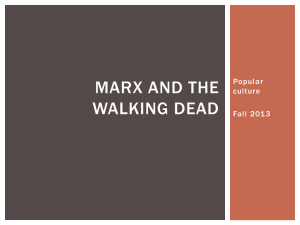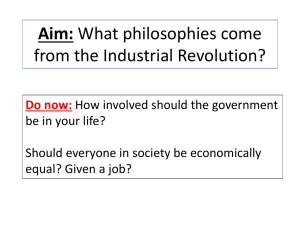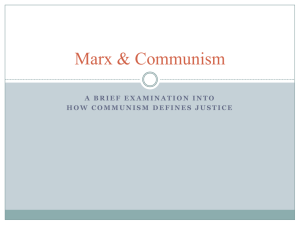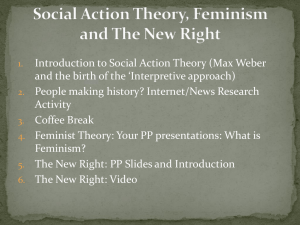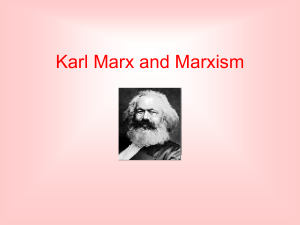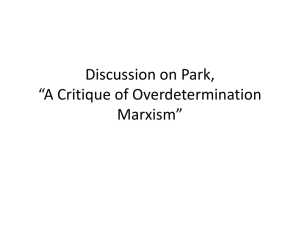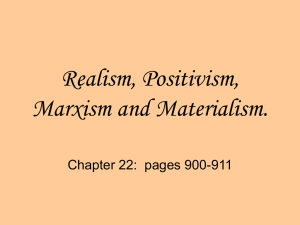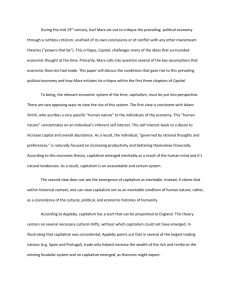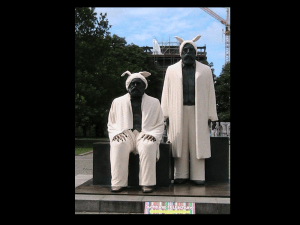Karl Marx
advertisement
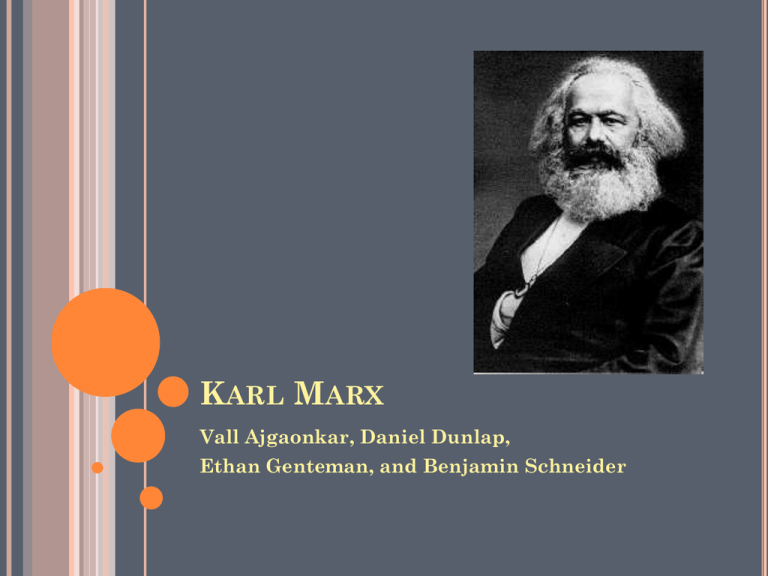
KARL MARX Vall Ajgaonkar, Daniel Dunlap, Ethan Genteman, and Benjamin Schneider AGENDA His critique of the political economy Das Kapital Labor Theory of Value Communist Manifesto Flaws of Capitalism Inevitable World Revolution Lasting Legacy Marx’s Biography Fun Facts CRITIQUE OF POLITICAL ECONOMY AND DAS KAPITAL CONTRIBUTION TO CRITIQUE OF POLITICAL ECONOMY (1859) States that British classical economists had erred by confusing the laws of the development of the economy. More generally speaking he thought they were confused on the construction of society according to the laws of nature, and did not take into consideration the laws of motion of history Economic features are distilled from the features of specific historical periods. thus feudalism, gave rise to capitalism, which because of its own internal contradictions, would give rise to another form of social organization. CONTRIBUTION TO CRITIQUE OF POLITICAL ECONOMY (1859) Explained what Marx believed was a complex system of relations among the individuals characterizing society at a given time, and lays down much of the groundwork needed to understand Das Kapital more famous writing Made the distinction between the ‘economic base’ or ‘structure’ of society and its ‘superstructure’ ‘structure,’ consists of four economic features: production, exchange, distribution, and consumption ‘superstructure,’ consisted of the remaining aspects of society such as politics, religion, art, etc. MARX’S MODES OF PRODUCTION The ancient mode of production The feudal mode of production The capitalistic mode of production DAS KAPITAL (1867) Was a critique of capitalism Analyses the laws which regulate the capitalist mode of production when reduced to their essence The analysis is simplified in abstract terms, in the sense that only two classes exist in society, the salaried workers and the capitalists Explores the relationship between value, exchange, and commodities A commodity is an external object that satisfies a human need either directly or indirectly. MARX’S DEFINITION OF WEALTH “the wealth of those societies in which the capitalist mode of production prevails, presents itself as an immense accumulation of commodities LABOR THEORY OF VALUE Useful things Quality and quantity Many attributes Can be used in many ways “use-value” in relation to commodities' quality trait of the thing itself independent of the amount of labor needed to make the commodity useful LABOR THEORY OF VALUE (CONT.) Exchange-value the proportion by which use-values of one kind exchange for use-values of other kinds. For example, corn and iron have an exchange relation, which means that a certain amount of corn equals a certain amount of iron. Each must therefore equal a third common element, and can be reduced to this thing. The common element cannot be a natural property of the commodity, but rather must be abstracted away from its use-value. Discarding use-values, only one property remains— the commodities are the products of abstract human labor. They are "congealed quantities of homogenous human labor." This common factor in the exchange-value of the commodity is its value. LABOR THEORY OF VALUE (CONT.) Implications price of commodities comes from how much labor was put into them objects with natural use-value: forests and other natural resources do not have value because no labor went into them Is this problematic? It is for modern theory, where exchange value is rooted in people's subjective preferences. COMMUNIST MANIFESTO HISTORY OF THE COMMUNIST MANIFESTO Written in Brussles, Belgium Authors: Karl Marx and Friedrich Engels Published on February 21st, 1848 Story of the class struggles throughout history In 2010, a modernized comic book version was released AUDIENCE This was NOT a book but a political pamphlet Targeted at the public to publicize the Communists’ views and beliefs Meant to be easily grasped by a general audience “THE HISTORY OF ALL HITHERTO EXISTING SOCIETY IS THE HISTORY OF CLASS STRUGGLES.” IDEAS Proletariat vs Bourgeois Class Struggle is unavoidable in Capitalism Capitalism is unstable Personal status = Social status MORE IDEAS Communists are the most advanced section of the working class parties. Communists and the Proletarians both have the same goal. Communism can be summed up into one sentence: Abolition of private property. GOALS Analyze problems with capitalism and the effect of class struggle Defend Communism from objections Outline demands for implementation of communism Prediction of a World Revolution Declaration of Allegiance Rally the Proletarians and motivate a Communist Revolution RECEPTION European Revolutionary Wave of 1848 Marx was accused of arming Belgian workers Authorities used The Communist Manifesto as evidence to blame Marx for collapse Marx was forced to flee Brussels in Belgium IN 2010, A MODERNIZED COMIC BOOK VERSION WAS RELEASED MARX’S LASTING LEGACY WIDESPREAD INFLUENCE Marx is thought as one of the most influential thinkers in history Enormous influence on world politics and intellectual thought Remembered for his ethical message of “morally empowering language of critique” against capitalist society Marx’s ideas led to the establishment of governments using Marxist thoughts to replace capitalism with communism or socialism/market socialism His intellectual thought has influenced academic study of the humanities and arts MARXISM Marxism as an economic and sociopolitical worldview Marxism views the socialist system as being prepared by the historical development of capitalism Historical Materialism Transition of capitalism to socialism is inevitable This conversion would lead to increased productivity The 1917 October Revolution was the first large scale attempt to put Marxist ideas into practice CRITICISM Criticized for the inevitability of socialist revolutions to overturn capitalism Soviet Union collapse People’s Republic of China shifting towards a market economy Increased profits from investments in human capital and technology Labor Theory of Value Marxism as the ideology of totalitarian states THE LIFE OF AN ANGRY MAN EARLY LIFE Born 1818 in Trier Eldest brother died at age of 4 Terrorized his lessintelligent siblings Feared and revered in school Clever pranks and sarcastic quips DUAL INFLUENCE Marx loved his father Lawyer and vineyard owner Neighbor Baron von Westphalen was like an uncle to young Karl Father: Newton, Locke, Leibnitz Baron: Shakespeare, Homer, Lord Byron KARL’S KILLER COLLEGE LIFE University of Bonn Enjoyed drinking Gambled much of his father’s money Transferred to University of Berlin Unkempt, shaggy Skipped class a lot Death of Father (1838) Turning point Quickly finished his degree from Univeristyof Jena THE YOUNG MAN AS A JOURNALIST Began work at Rheinische Zeitung But gained a wife! Became editor at age of 24 Govt shut down the paper Marx lost job Jenny von Westphalen 1843 moved to Paris Met Freidrich Engels Loved the work of Hegel Began writing Main point: The foundations of capitalism were quickly crumbling and that the masses would soon erupt in revolution and shake the owners till they tumbled from their pedestals ADDITIONAL REFERENCES Buchholz, Todd G. New Ideas from Dead Economists: An Introduction to Modern Economic Thought. London: Penguin, 2007. Print. Vaggi, G., & Groenewegen, P. (2003). A Concise History of Economic Thought. New York: Palgrave MacMillan "Karl Marx." Wikipedia. Web. 6 Mar. 2012. <http://en.wikipedia.org/wiki/Karl_Marx>.


